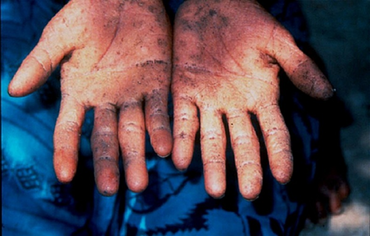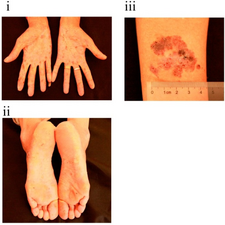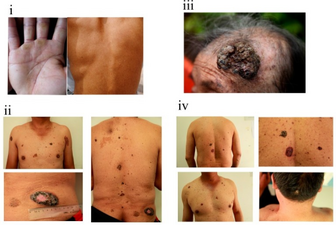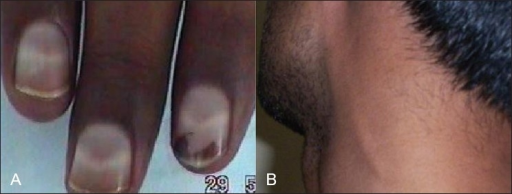Arsenical keratosis
| Arsenical keratosis | |
|---|---|
 | |
| Arsenic keratosis - pigment base of fingers and sides of palms with corn-like warty bumps | |
| Specialty | Dermatology |
| Symptoms | Yellow corn-like warty small bumps preceded by dark skin on palms and soles,[1] |
| Complications | Bowen's disease, squamus cell carcinoma, basal cell carcinoma[2] |
| Usual onset | 20-30 years after arsenic poisoning[1] |
| Causes | Longterm poisoning with arsenic[1] |
| Diagnostic method | By its appearance[3] |
| Differential diagnosis | Actinic keratosis, seborrhoic keratosis, squamous cell carcinoma in situ[1] |
Arsenical keratosis (AK) is a pre-cancerous corn-like small bump in the skin caused by longterm poisoning with arsenic.[1] It is typically yellow and warty, and is preceded by dark marks in the skin, usually 20-30 years after exposure to arsenic from usually a herbal medicine or contaminated water from wells.[1] It is frequently seen on the palms of hands and soles of feet, and also the ears.[2] They can look like palmar-pits.[2] The dark marks may look like 'raindrops' and there may be associated Mees' lines across the nails.[3] It is frequently the first sign of chronic arsenic poisoning.[4]
Actinic keratosis, seborrhoic keratosis, and squamous cell carcinoma in situ may appear similar.[1] AK may persist indefinitely, and some may develop into invasive squamous cell carcinoma. Metastatic arsenic squamous cell carcinoma and arsenic-induced malignancies in internal organs such as the bladder, kidney, skin, liver, and colon, may result in death.[5]
Signs and symptoms
AK typically presents with yellow corn-like warty small bumps preceded by dark skin.[1] It is frequently seen on the sides of the palms of hands, base and sides of fingers and the feet.[1] The dark marks may look like 'raindrops' and it may be associated with Mees' lines across the nails.[3]
-
Rash on the palms due to arsenic poisoning
-
Pigmentation, de-pigmentation and hyperkeratosis
-
Severities of skin symptoms observed among the 12 individuals in one family with chronic arsenic poisoning
-
(A) Arsenic neuropathy and Mee's line (B) great auricular nerve thickening
Cause
Arsenic occurs naturally in the earth's crust and is widely distributed in the environment,[6] Arsenical compounds are used in industrial, agricultural, and medicinal substances. Arsenic is also found to be an environmental contaminant in drinking water (well water) and an occupational hazard for miners and glass workers.[2] Arsenic may also causes other conditions including: Bowen's disease,[7] cardiovascular diseases, developmental abnormalities, neurologic and neurobehavioral disorders, diabetes, hearing loss, hematologic disorders, and various types of cancer.[5]
Mechanism
Arsenite impairs nucleotide excision repair,[8] and it may also affect gene expression by increasing or decreasing DNA methylation. The high affinity of arsenic for sulfhydryl groups makes keratin-rich cells (e.g., epidermal keratinocytes) a sensitive target for arsenic-induced toxicity. Arsenic has been shown to alter epidermal keratinocyte differentiation processes,[9] induce overexpression of growth factors,[10] and enhance proliferation of human keratinocytes.
Diagnosis
The diagnosis of Arsenical keratosis is established by its appearance, a urine test and histopathological test.[11]
Treatment
- A chelating agent (e.g., dimercaprol) may be helpful to correct acute arsenic exposure, but it has minimal or no effect for patients who had arsenic exposure a long time ago.
- Oral retinoids (e.g., acitretin,[7][12][13] etretinate[14]) may be helpful in treating arsenic-induced cutaneous lesions and in reducing the risk of cutaneous and internal malignancy formation, especially in Bowman's disease.
- Topical 5-fluorouracil cream[13] or 5% imiquimod cream[15] may be useful in treating arsenical keratoses and Bowen's disease.
References
- ↑ 1.0 1.1 1.2 1.3 1.4 1.5 1.6 1.7 1.8 DE, Elder; D, Massi; RA, Scolyer; R, Willemze (2018). "Premalignant keratoses: Arsenical keratosis". WHO Classification of Skin Tumours. Vol. 11 (4th ed.). Lyon (France): World Health Organization. pp. 52–53. ISBN 978-92-832-2440-2. Archived from the original on 2022-07-11. Retrieved 2022-08-13.
- ↑ 2.0 2.1 2.2 2.3 James, William D.; Elston, Dirk; Treat, James R.; Rosenbach, Misha A.; Neuhaus, Isaac (2020). "29. Epidermal nevi, neoplasms, and cysts: Arsenical keratosis". Andrews' Diseases of the Skin: Clinical Dermatology (13th ed.). Edinburgh: Elsevier. p. 643. ISBN 978-0-323-54753-6. Archived from the original on 2024-04-17. Retrieved 2024-04-17.
- ↑ 3.0 3.1 3.2 Johnstone, Ronald B. (2017). "31. Tumors of the epidermis". Weedon's Skin Pathology Essentials (2nd ed.). Elsevier. p. 514. ISBN 978-0-7020-6830-0. Archived from the original on 2024-04-17. Retrieved 2024-04-17.
- ↑ Shajil, Chandana; Mahabal, Gauri D. (2022). "Arsenical Keratosis". StatPearls. StatPearls Publishing. PMID 32809405. Archived from the original on 2022-08-15. Retrieved 2022-08-14.
- ↑ 5.0 5.1 Tchounwou PB, Centeno JA, Patlolla AK (January 2004). "Arsenic toxicity, mutagenesis, and carcinogenesis--a health risk assessment and management approach" (PDF). Mol. Cell. Biochem. 255 (1–2): 47–55. doi:10.1023/B:MCBI.0000007260.32981.b9. PMID 14971645.
- ↑ Duker AA, Carranza EJ, Hale M (July 2005). "Arsenic geochemistry and health". Environ Int. 31 (5): 631–41. doi:10.1016/j.envint.2004.10.020. PMID 15910959.
- ↑ 7.0 7.1 Yerebakan O, Ermis O, Yilmaz E, Basaran E (February 2002). "Treatment of arsenical keratosis and Bowen's disease with acitretin". Int. J. Dermatol. 41 (2): 84–7. doi:10.1046/j.1365-4362.2002.01372.x. PMID 11982642.
- ↑ Hartwig A, Groblinghoff UD, Beyersmann D, Natarajan AT, Filon R, Mullenders LH (February 1997). "Interaction of arsenic(III) with nucleotide excision repair in UV-irradiated human fibroblasts". Carcinogenesis. 18 (2): 399–405. doi:10.1093/carcin/18.2.399. PMID 9054635.
- ↑ Kachinskas DJ, Phillips MA, Qin Q, Stokes JD, Rice RH (November 1994). "Arsenate perturbation of human keratinocyte differentiation". Cell Growth Differ. 5 (11): 1235–41. PMID 7848924. Archived from the original on 2013-02-23. Retrieved 2021-05-07.
- ↑ Germolec DR, Yoshida T, Gaido K, et al. (November 1996). "Arsenic induces overexpression of growth factors in human keratinocytes". Toxicol. Appl. Pharmacol. 141 (1): 308–18. doi:10.1006/taap.1996.0288. PMID 8917704.
- ↑ Shajil, Chandana; Mahabal, Gauri D. (2022). "Arsenical Keratosis". StatPearls. StatPearls Publishing. Archived from the original on 26 February 2022. Retrieved 10 March 2022.
- ↑ Son SB, Song HJ, Son SW (March 2008). "Successful treatment of palmoplantar arsenical keratosis with a combination of keratolytics and low-dose acitretin". Clin. Exp. Dermatol. 33 (2): 202–4. doi:10.1111/j.1365-2230.2007.02596.x. PMID 18039342. Archived from the original on 2013-01-05.
- ↑ 13.0 13.1 Khandpur S, Sharma VK (October 2003). "Successful treatment of multiple premalignant and malignant lesions in arsenical keratosis with a combination of acitretin and intralesional 5-fluorouracil". J. Dermatol. 30 (10): 730–4. doi:10.1111/j.1346-8138.2003.tb00468.x. PMID 14684956. Archived from the original on 2011-07-22.
- ↑ Sharma SC, Simpson NB (1983). "Treatment of arsenical keratosis with etretinate". Acta Derm. Venereol. 63 (5): 449–52. PMID 6197851.
- ↑ Boonchai W (April 2006). "Treatment of precancerous and cancerous lesions of chronic arsenicism with 5% imiquimod cream". Arch Dermatol. 142 (4): 531–2. doi:10.1001/archderm.142.4.531. PMID 16618886.



